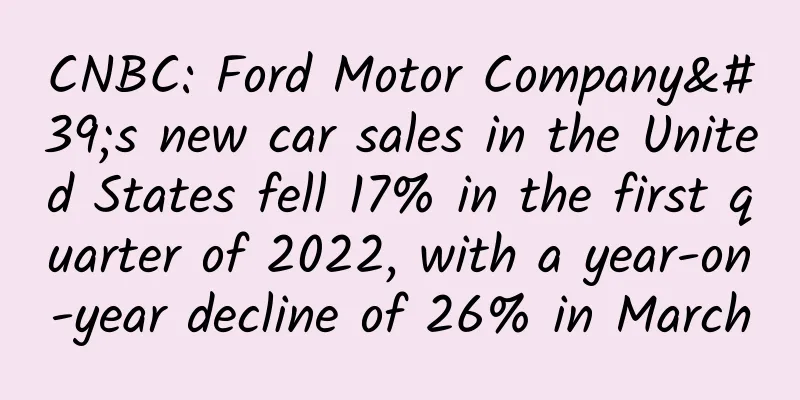CNBC: Ford Motor Company's new car sales in the United States fell 17% in the first quarter of 2022, with a year-on-year decline of 26% in March

|
According to CNBC, Ford Motor Company's new car sales in the United States fell 17% in the first quarter, including a 26% year-on-year drop in March, due to the global shortage of semiconductor chips. Sales of Ford and Lincoln, two brands under Ford Motor Company, have both declined. On Monday local time, Ford announced first-quarter sales of 432,132 vehicles, including 159,328 vehicles in March, in line with analysts' expectations. Ford truck sales fell 23% in the first quarter, car sales fell 49%, and SUV sales fell only 5.1%. Ford Vice President Andrew Frick said that the company's sales business has seen some good momentum after entering the spring sales season. He said: "Although the global shortage of semiconductor chips continues to pose challenges, we have seen an improvement in sales in March compared to February (129,273 vehicles), and the inventory in transit has increased by 74% compared to February. The F series received a record 50,000 new retail orders in March. And 41% of our overall retail sales came from previous retail orders." Looking at the automotive market, the first quarter of 2022 was a very difficult period for full-size and heavy-duty pickup truck manufacturers. With the exception of the Toyota Tundra, sales of other models continued to decline across the board. However, the Ford F-Series remains the top-selling brand, including the F-150 and Super Duty. As of March, Ford sold a total of 140,701 pickup trucks, which is more than its competitors, but compared with the 204,797 units sold in the same period last year, sales have shrunk by as much as 31%. Industry insiders believe that while the increase in auto inventories in March laid the foundation for the industry's development in the second quarter, inventories are still very tight by past standards. Supply bottlenecks are still limiting the pace of auto production. Deliveries to dealers fell sharply in the second half of last year due to a lack of key components, especially microchips, for automakers, and are only now gradually recovering. As traditional automakers are caught in a supply chain crisis, the pace of transformation has slowed down, and gasoline prices are skyrocketing, consumers are more inclined to electric vehicles. As the industry leader, Tesla has delivered an excellent answer. Tesla is one of the few companies that has achieved growth. The company said on Saturday that its first-quarter deliveries reached a record 310,000 vehicles, up from 185,000 vehicles in the same period of 2021, a year-on-year increase of 67.5%, in line with Wall Street's previous forecasts. Tesla's growth in the first quarter continued the momentum of last year's sales surge, when Tesla's sales almost doubled to nearly 1 million vehicles and surpassed Volvo and Subaru. This is based on Tesla's good response to the chip shortage, as it can replace scarce chips with available chips by adjusting the software. Tesla's electric car sales are currently outstripping those of other car types, and electric car sales are growing faster than other types of cars. As gasoline prices soar and remain high, electric car sales may grow further. If the chip shortage eases later this year, as some industry executives predict, traditional automakers may take a larger share of the electric car market. |
Recommend
Shishi SEO training: Website optimization and ranking is a complex but important task
Website optimization and ranking is a complex but...
How much does it cost to develop a catering app? How much does it cost to develop a catering WeChat app?
How much does it cost to develop a catering mini ...
Is strabismus just "crossing the eyes"? Doctors remind you to pay attention to these things
“ "Doctor, my child's eyeballs are not i...
How much does it cost to attract investment in Liupanshui Textile and Leather Mini Program?
How much does it cost to attract investment for t...
2011-2016, what can we find from the best of Apple AppStore?
Apple AppStore has just announced the results of ...
Top 10 PR Creative Communications in 2019
Public relations requires more creativity. I have...
How much does it cost to develop a learning app in Liuzhou?
Liuzhou learned about the types of WeChat applet ...
Space will be very busy in 2022, and global aerospace will face these difficult tasks →
In 2022, the global space industry is expected to...
Summary of Android processes and threads
This article is translated from Android official ...
Can pets cause lung cancer? People who keep such pets at home should pay attention...
How does the doctor know what disease I have? To ...
Is the pangolin the real-life version of "Wolverine"?
Source: China National Geographic Exploration Pla...
Is it necessary for Zhaoqing flower shop to develop a mini program? Why do we need to create a flower mini program?
For flower shop owners, offline channels can no l...
3 factors to improve APP channel rating and resource position acquisition
By the end of 2014, the industry's "chann...
HTML5 Local Storage
[[145256]] What is localstorage A few days ago, I...









